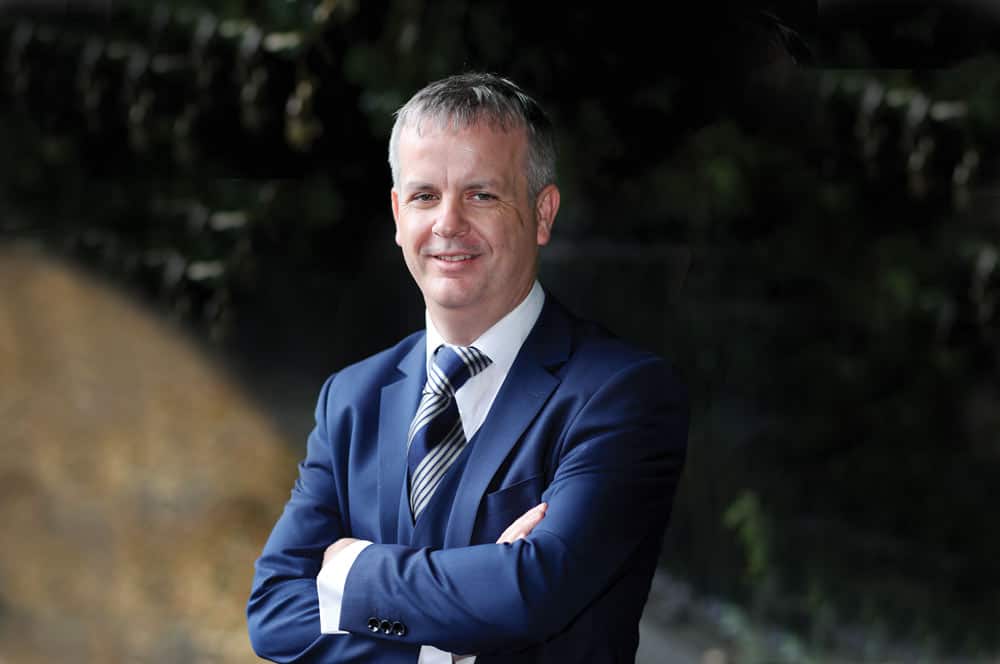Cathal Lane, managing partner, Tomkins
Cathal Lane talks to Business & Finance about patents, intellectual property and their place in the research landscape.
Q: Tell us about the IP market in Ireland. How large is it?
While Ireland bats above its weight in terms of applications filed per head of population, some of this is due to multinationals using Irish companies to hold patent applications – not all of these patent applications relate to inventors or inventions from or made in Ireland. Given that the population is relatively low, absolute numbers are not massive.
The opportunity that is much larger is for Irish firms to supply IP services at the European level to non-Europeans. Germany and the UK together have about 50% of European patent attorneys. Ireland has less than 0.01%.
The European patent office alone has a €2bn a year budget. Approximately 280,000 European applications are being filed at the present time per year. I estimate that Ireland certainly handles less than 1% of these – and possibly even less than 0.5% quite frankly.
So, there is a huge opportunity for Ireland. Leaving aside R&D costs, the European patent application process alone probably costs €7,000 to €30,000 depending on a large number of factors, including how many countries are ultimately of interest.
Q: What services do Tomkins provide?
Tomkins provides a range of services, from harvesting the information necessary to identify intellectual property (IP), deciding how to best protect it, conducting searches to see if an invention or a trademark has been the subject of an application by somebody else, advising how to deal with issues arising relating to ownership, licensing, as well as how to value.
We have helped with consolidation where there have been mergers, changes of ownership, registering security interests, identifying the relevance of IP to products being used (including mapping patents onto specific products) and presenting this information in reports that are accessible to all management, rather than decipherable only to those directly involved.
Q: Can you tell me about Tomkins’ history in Ireland?
Tomkins started as a very small firm around 1930 when Artur Tomkins, who was a UK-qualified patent attorney, saw an opportunity to come and set up in Ireland to handle Irish applications for his UK colleagues. He was essentially the grandfather of intellectual property in Ireland. He died in 2004 at the age of 104, having taken out an SSIA aged 100.
When Cmdr Hadfield wanted to sing ‘Space Oddity’ from the space station, he had to get permission across all jurisdictions – you don’t escape IP, even in space
Because of its deep history, Tomkins has been involved in writing IP legislation and has been to the forefront of issues, including helping to register state emblems such as the harp. Now it is a firm of over 40 people serving multinationals, SMEs and start-ups.
Q: Tell us about your customer base.
We can count among our clients one of the top 10 patent filers in the world. They are a US company and we provide European patent services to them. We serve multinationals, SMEs and start-ups, including some very successful home-grown Irish companies which have expanded abroad. We have clients who export agricultural machinery all over the world (including Asia), a small but extremely innovative food ingredient business that is revolutionising the dairy industry and counts the top dairy producers in the world among its clients, and well-known brands including ECDL and Hostelworld.
Q: What types of organisations have the most use for IP services?
I would say that Irish-based entities underestimate the importance of IP, and they particularly underestimate what they can protect themselves. It is only when they open their eyes by searching to see what competitors are up to in the patent or trademark world, or searching patent databases for a specific technology, that they realise what others are up to and what they themselves should be thinking about. Many people have heard of patents, but have never actually studied one, considered one, or looked at what the competitors are up to.
The organisations that best use IP are those that can exploit some part of it themselves. Coming up with an idea, protecting it, and then trying to license to a third party is difficult.
The organisations that least use IP are those that probably think of it in defensive terms, as being needed for litigation. For those I think they miss the positive aspect of leveraging it to actually co-operate with others to generate more commercial activity using shared resources.

Q: How will the IP sector in Ireland be affected by Brexit?
I believe in the end this will be very positive. While Ireland as a whole may not fare well following Brexit, there is an opportunity for IP services. Many UK firms are serving clients outside the EU, and they may rethink who they wish to use for such services, given that the UK will not be part of the EU.
Q: What does Tomkins do to educate people on the importance of IP?
Tomkins, in essence, educates each of its clients as well as many more that phone up and ask questions about what they might be able to do, but never actually engage as a client. We have been heavily involved in the education sector, providing lectures within university courses, doing semesters as lecturers, speaking at events (including those hosted by IRDG, the Innovation Academy, the New Frontiers programme, the Ryan Academy, SFI, and so on).
I believe that there should be an IP academy in Ireland where nothing but intellectual property is taught, discussed and generated.
Q: What threat do patent trolls present in the IP space?
Patent troll is a term that was originally coined for entities that did no inventing/research and development themselves, but bought patents that they thought they could assert against people who were actually commercialising products. Historically, contentious patent matters arose between two entities who are trying to exploit similar technologies. However, if an entity is not actually selling anything there is not usually much opportunity to counter-sue them for infringement.
The plan is to continue to recruit good people, communicate simply with our clients, and provide transparency
While there are still are some organisations that have the hallmarks of a troll, many have morphed into entities that also hire engineers, scientists and other inventors, and develop some of the technologies that they are vested in.
So all in all, I think this will evolve and change just like other areas do. The one danger is that there will be an overreaction to a troll and retrograde changes will be made to IP laws as a result. They represent a small proportion of IP activity and while their activities may be more headline-grabbing, it should be considered in context.
Q: How does the Irish IP sector compare to that of other countries?
As we have seen, the IP profession in Ireland is very small. We are tiddlers in a huge pond. While we may have a high filing rate per head of population, absolute numbers are not huge and we should discount inventions made outside Ireland, but where patent applications are filed in the name of Irish companies. We have a huge opportunity for growth.
Q: What areas of expertise does Tomkins cover?
In order to become a patent attorney you have to have a science or engineering background first to at least primary degree level. You then train as a patent attorney. Our trademark attorneys have legal/business and other backgrounds. Given that on the patent side that you need to understand the technology, we have people with backgrounds in physics, electronics, engineering, ICT, life sciences, including biotechnology and pharmaceutical, and chemistry. We cover all technology and business sectors for our clients.
Q: What are the future challenges facing the IP industry?
The main challenge will be around the ever-increasing pace of technology development and issues around whether the IP legislation can keep apace. I have heard comments that in a very fast-moving technology landscape with short-lived products and so on, IP is becoming less and less relevant. If anything, it is becoming more and more relevant, and those who are sophisticated enough to master it and leverage it will succeed. When Cmdr Hadfield wanted to sing ‘Space Oddity’ from the space station, he had to get permission across all jurisdictions – you don’t escape IP, even in space!
Q: How do you plan to grow Tomkins in the coming years?
The plan is to continue to recruit good people, communicate simply with our clients and provide transparency and easy-to-understand reports that allow our clients to make key decisions on what is, or is not, a good decision in an IP context. The aim would be to become more international in line with our clients.







